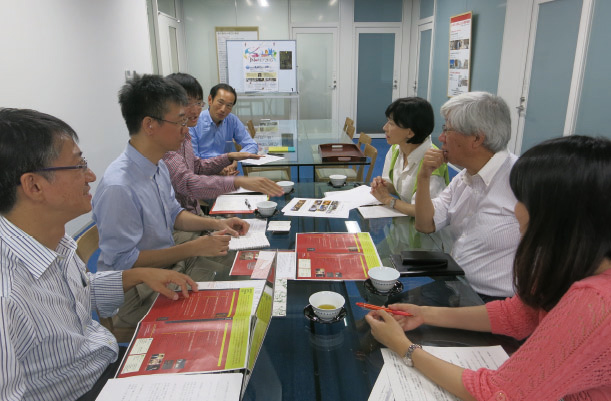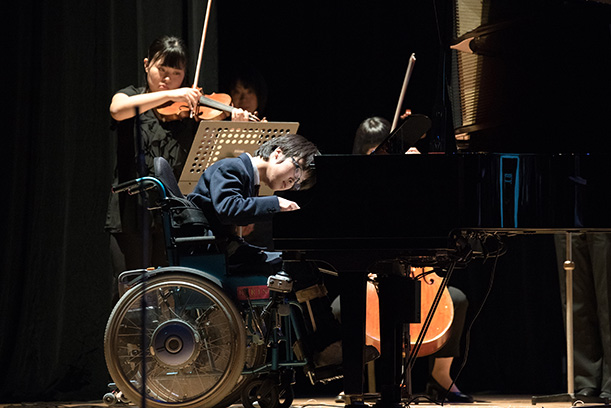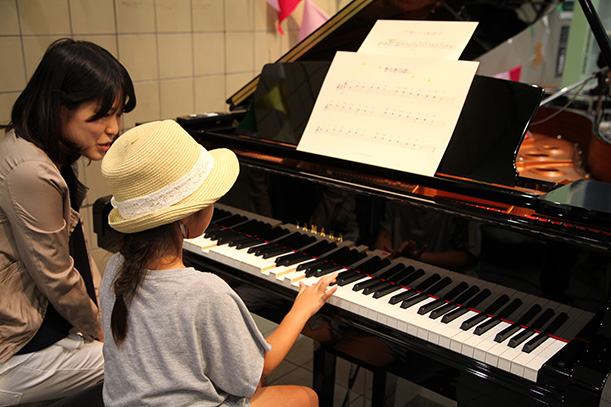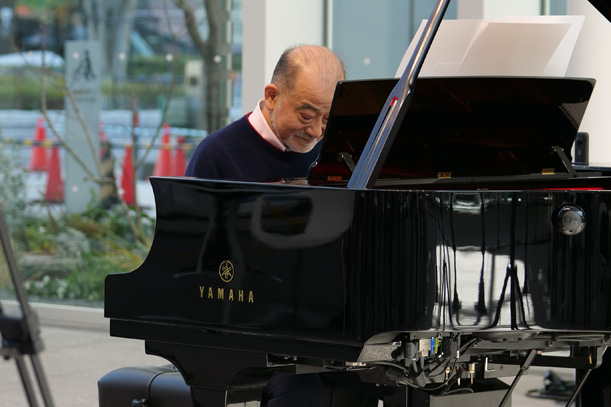The development of Daredemo Piano was born out of the dream of a single high school student, who happened to have disabilities affecting their hands and legs, to play Frédéric Chopin’s nocturnes by themselves.
Yamaha Corporation has been involved in the COI Site of Tokyo University of the Arts, a facility that is part of the COI STREAM innovation creation program of the Ministry of Education, Culture, Sports, Science and Technology and the Japan Science and Technology Agency, since October 2015. Our involvement has included the provision of technical support to an inclusive arts research group.
The concept of inclusive arts involves pursuing the ideals of a society in which everyone is able to connect equally through art and in which art is more accessible to all. This is a theme that was researched by Tokyo University of the Arts even prior to the launch of its COI program.
One day, a researcher on this theme visited a special needs school, where they saw high school students with cerebral palsy trying to play pianos and digital keyboards with fingers that could barely move.
This experience inspired the researcher to create an instrument that could be used to perform entire pieces with a single finger.
They sought to develop an instrument in which the performer was still the central component, using their hands and legs, in whatever capacity, to produce beautiful music. The key to realizing this vision was found in Yamaha’s Disklavier™ player piano and in its automatic accompaniment technology. Disklavier™ uses a system in which the notes played by one’s right hand, generally used for the melody, are instantly translated to MIDI data which is compared with the music database of our automatic playback system. This system then supplies the notes that would normally be played with the left hand, while matching the tempo of the performer. When combined with control over the pedal manipulation system installed in Disklavier™, this allows for performers to play songs exactly as they envision.
This automatic playback system was first revealed at a miniature concert held as part of the Geidai 21: Geidai Arts Special 2015 - Disability & Arts in December 2015, where it garnered a great deal of attention. At this concert, students of special needs schools with disabilities affecting their hands and legs played songs ranging from Chopin to J-POP. This ensemble between people and machines
allowed the students to overcome their disabilities to accomplish their dreams of playing their favorite songs, moving the audience while also demonstrating the new possibilities for music unlocked through our automatic playback system.
This system has since been exhibited at various other events, including the Shibuya Zunchaka! music festival held in the Shibuya area of Tokyo and the Super Welfare Expo that exhibits social welfare innovations.
Through these exhibits, we are informing a wide variety of individuals on this new way of enjoying musical performances and the new horizons for social welfare that can be explored through performances.

![[ photo ] Shaping an Inclusive Future in which Everyone Can Know the Joy of Playing the Piano - Daredemo Piano -](images/pict_main.jpg)
![[ icon ] 3: GOOD HEALTH AND WELL-BEING, 4: QUALITY EDUCATION, 10: REDUCED INEQUALITIES, 16: PEACE, JUSTICE AND STRONG INSTITUTIONS, 17: PARTNERSHIPS FOR THE GOALS](images/pict_icon.jpg)
![[ logo ] STI for SDGs AWARD](images/pict_award-logo.png)




![[ image ] ICT-Powered Remote Performance Experiment](images/pict_06.jpg)
![[ photo ] Oko Arai](images/pict_07.jpg)
![[ photo ] Motoichi Tamura](images/pict_08.jpg)


